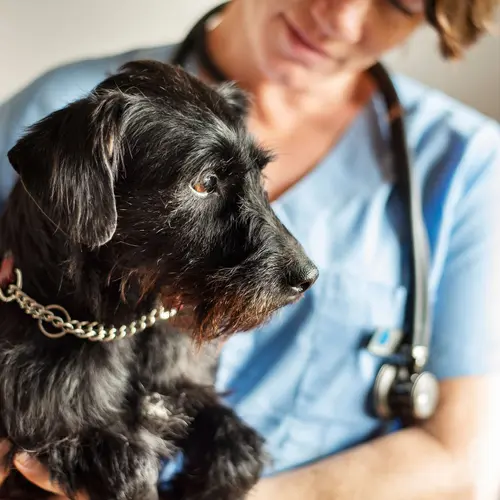
There are two main types of parvoviruses: canine parvovirus and human parvovirus B19. Canine parvovirus affects canines only, including pet dogs, wolves, and hyenas. Parvovirus B19, on the other hand, is a human variant that only affects humans.
Given the nature of canine parvo, can humans get parvo from dogs? The short answer is no. Parvovirus can't be transmitted between humans and dogs.
What Is Parvovirus?
You may have heard of the canine variant of parvovirus, but the human parvovirus B19 is a bit different. Parvovirus B19 was first discovered in 1974 during evaluation and testing for hepatitis B. It was later given its name by the International Committee on Taxonomy of Viruses in 1985.
At the time, the canine parvovirus caused a worldwide epidemic of gastroenteritis and myocarditis in dogs. But the human variant differs in certain ways from the one that affects our canine companions.
Parvovirus B19 is a common infection that's transmitted from person to person. It often causes your body to temporarily stop producing red blood cells. And humans get parvovirus more often than most people realize. In fact, in the United States, almost 50% of adults and 85% of older individuals have had a parvovirus infection in their lifetime.
Most people infected with parvo are unaware that they even have it as it rarely shows symptoms. The symptoms that do show up are mostly mild. Symptoms mainly appear in people with compromised autoimmune systems, which is an immune system that may not be functioning normally.
People of all ages and ethnic groups are at risk of contracting the parvo B19 virus. People with compromised immune systems or those whose bodies struggle to produce normal red blood cells may be at a higher risk of infection. Children are also at a higher risk of contracting the parvo B19 virus but they're usually asymptomatic, meaning they're unlikely to show symptoms. If they do, the symptoms will mostly be mild.
What Causes Parvovirus?
Parvovirus causes in humans are linked to transmission through the saliva, sputum, or nasal mucus of an infected person. When a person is contagious, a simple cough or sneeze is enough to infect others nearby with parvo. The contagious period is most prevalent when you experience a fever and cold-like symptoms. If you notice a rash from the parvovirus B19 infection, then you're most likely past the contagious phase.
Parvovirus cases can also be linked to transmission through blood. If you're pregnant and get infected with parvovirus B19, you have a chance of passing the virus to your child.
The canine parvovirus infects dogs and other canines depending on multiple factors, like how often the dog is exposed to the virus and the immune status of the dog.
What Are the Symptoms of Parvovirus in Humans?
The two main parvo symptoms in humans are rashes and swollen joints.
Rashes Across the Face and Body
Parvovirus B19 often results in a disease called fifth disease. Fifth disease occurs more often in children than in adults and causes a mild rash across the face. This rash is commonly referred to as a “slapped cheek” rash. It can show up anywhere from 4 to 14 days after your child is infected and may appear on their cheeks and/or their chin.
A second rash may form in the days after the first rash appears. The second rash often occurs on the chest, back, buttocks, arms, or legs, and it may be itchy. The rash can be mild or severe and may last from 7 days to multiple weeks.
Painful and Swollen Joints
Fifth disease may also cause painful and swollen joints, sometimes referred to as polyarthropathy syndrome. This symptom of fifth disease is more common in adults. The painful swelling typically lasts anywhere from 1 to 3 weeks but may last for months.
Potential Symptoms
Other parvovirus symptoms include:
- Fatigue or tiredness
- Low-grade fever
- Stomachache
- Arthritis
- Headache
- Gloves and socks syndrome — when red or purple spots appear on the hands and feet
Serious Symptoms
For the most part, your symptoms will be mild and you'll have no other health issues as a result of infection. But in rare cases, parvovirus B19 can cause serious health complications. One such complication is severe anemia. If the anemia is long lasting, it will require medical intervention. Serious complications occur mostly in those with a compromised immune system.
Although it's rare, there's a slight risk of stillbirth or miscarriage occurring in pregnant people who have contracted this virus. This may happen if the fetus develops hydrops fetalis or severe anemia. In this case, you may require a fetal blood transfusion.
What Are the Symptoms of Parvovirus in Dogs?
The symptoms for canines vary depending on their health and age. For younger dogs, the parvovirus could infect the heart, leading to heart inflammation and arrhythmias. It can also cause severe diarrhea and nausea. This can result in the death of the dog due to dehydration, shock, and potential effects of toxins that enter the bloodstream.
The most common symptoms of parvovirus in dogs are:
- Tiredness
- Depression
- Loss of appetite
- High fever
- Vomiting
- Diarrhea
How Is Parvovirus Diagnosed?
If you suspect that you've been infected with parvovirus B19, talk to your doctor. They'll conduct a physical exam, ask about any symptoms you've been having, and ask about the medications you're currently taking. Testing beyond this exam is rarely done as most infected people are asymptomatic.
If your doctor suspects that you've been infected with parvo and are at higher risk of severe complications, then they may order blood tests or, in rare cases, a bone marrow test. If you're pregnant, you may need your amniotic fluid or fetal cord blood tested. Doctors may also conduct ultrasounds more frequently to keep a closer eye on the fetus.
In addition, if you've had parvovirus B19 in the past — or think you might have had it in the past — your physician may want to conduct a test for antibodies against the virus in your blood.
If no tests are required for your specific care, your physician may simply ask you a series of questions to help diagnose you with a parvovirus infection. These questions might cover:
- What symptoms you've had and how long you've had them
- Whether you're immunocompromised
- What medications you're currently taking
- Whether you've been exposed to anyone who was diagnosed with parvovirus B19 or fifth disease
Diagnosing Parvovirus in Dogs
The most common way to diagnose the parvovirus in dogs is by testing their fecal matter. The vet will order an ELISA test, which is short for enzyme-linked immunosorbent assay. This test can be done in under 15 minutes, and the results are generally very accurate.
What Is the Treatment for Parvovirus?
There are various treatments for parvovirus. The one your doctor chooses for you will depend on your age and whether you're immunocompromised or pregnant.
Treatments for Healthy Children and Adults
Under normal circumstances, a parvovirus B19 infection will clear up on its own and any rashes will disappear within 7 to 10 days, although the rash may stick around for a few weeks.
Because there are usually no symptoms — and any symptoms that do show up are usually mild — children and adults who are otherwise healthy with well-functioning immune systems will not need any special treatment.
If you have a headache or fever, you can take acetaminophen to help alleviate those symptoms. If you have joint pain or swelling, you can take non-steroidal anti-inflammatory medicine, such as ibuprofen. As with any virus or infection, it’s important to get lots of rest and drink plenty of fluids while you recover.
Treatment for Immunocompromised or Pregnant People
With mild parvovirus B19 infections, symptoms should disappear within 5 to 7 days. For more severe cases, the symptoms may linger, and parvovirus treatment may be necessary. In most infected adults, the treatment generally involves immunoglobulin infusions based on body weight for 2 to 3 days.
For pregnant people who get infected, regular examinations are necessary. These checkups may include weekly ultrasound tests and, potentially, fetal blood transfusions. These will help reduce the chances of complications for you and your fetus.
How Can You Prevent Parvovirus?
At this time, there are no vaccines or medicines that can prevent parvovirus B19 infections. Still, there are steps you can take to decrease your risk of becoming infected with this virus or infecting others.
These preventive steps include:
- Regularly washing your hands with soap and water
- Making sure to cover your mouth and nose when you cough and sneeze
- Avoiding touching your eyes, nose, and mouth
- Avoiding being in close proximity to other people who are sick
- Staying home if you feel unwell
Those who have been infected with the parvovirus B19 infection previously have developed immunity to the disease and are no longer at risk of getting it.
